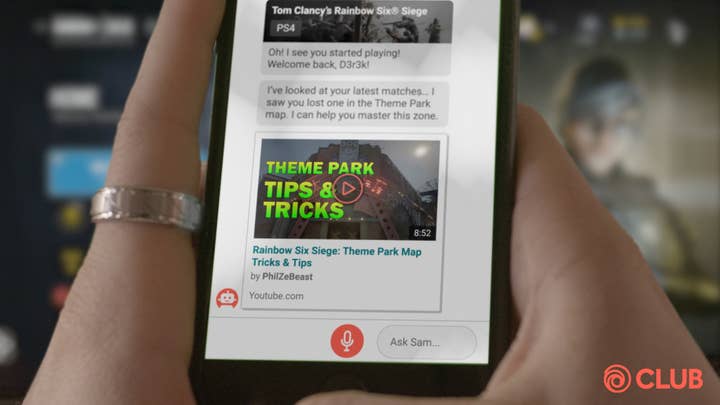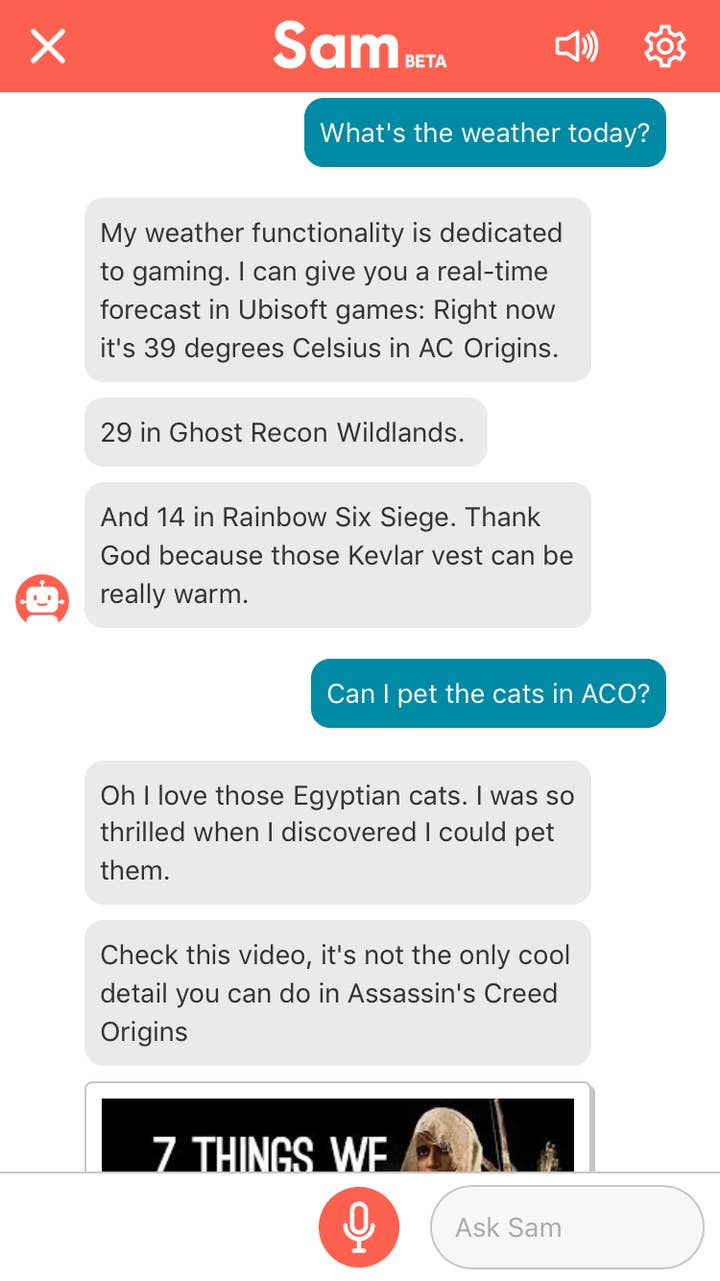Meet Sam, Ubisoft's personal gaming assistant
Assassin's Creed publisher explains why it's taking a leaf out of Apple and Amazon's book to better serve its players
"Siri, reschedule my dinner date to tomorrow. Alexa, play my Terrorist Hunt playlist. Sam, what challenges are available in Rainbow Six: Siege?"
This is the type of man-machine conversation Ubisoft hopes to be part of in the near future through the launch of Sam, the games industry's most comprehensive personal assistant to date.
Like Siri, Alexa, Cortana and the other personal assistants emerging from various industries, this new creation allows players to ask questions - by voice or by text - in order to access information. Specifically, information around either the publisher's games or the Ubisoft Club, the social network linking all of those games together.
Sam will tell users everything from when the next Far Cry is due for release to what esports event the company has most recently run. And by linking to the player's profile, it can quickly tell you your level, kill count, time spent, challenges they are close to completing and more.

But perhaps the biggest question is: why?
"We've seen players looking for this information, and either it takes time for them to find or they don't find it and they're not very happy - and they don't tend to call customer support for it," Ubisoft brand development director Damien Moret tells GamesIndustry.biz. "So we wanted to fill the gap there, to streamline information so they can find that stuff very fast. We know people are looking for that.
"Our games are different now, they're connected, so we need to find a way to help. It's also to facilitate the process so players spend less time searching for the info they need and more time in the game. So it will have an impact on the way people play because they won't lose time looking for information."
That clarifies the need that Sam serves, but not how many people need it. The personal assistant is only available through Ubisoft Club's mobile app. With most consumers already juggling profiles on Xbox Live and/or PlayStation Network, plus social media accounts like Twitter and Facebook, is there even enough activity on the Club to warrant such a project?
Moret reports that by the end of 2017, close to 49 million people had connected to the service, although he was unable to share data on how many of them access the Club on a regular basis or via mobile. Nonetheless, he assures that the audience for Sam is "definitely not a niche."
Sam is currently only available in Canada and in English, but Ubisoft plans to add more markets to the open beta in the next few months. Moret says that this will be an ongoing project whereby the publisher monitors how the assistant is used and how it can be improved before building up to a worldwide release.
"We've seen players looking for this information, and either it takes time or they don't find it - and they don't tend to call customer support for it"
The system is built with Google Cloud's Dialogflow Enterprise Edition technology, which uses natural language processing in order to interpret what the user is saying and deliver the appropriate response. Behind the scenes, Ubisoft will be able to see the most frequently asked questions and use that as a guide to expanding Sam's database of answers and suggestions.
The name derives from Ubisoft's search for a simple, cross-gender moniker that anyone can pronounce - and, Moret tells us, it's a small nod to long absent Splinter Cell star Sam Fisher. While there are no plans to transform Sam into some kind of mascot for the Club, or even the publisher in general, Ubisoft has gone to great lengths to give the personal assistant a little character.
"We wanted to give it a name because we wanted to build up a personality and a relationship," Moret explains. "That's why there are also some jokes, funny reactions, you can ask Sam whether it's human - stuff that makes it fun to interact with. We have to remain useful but fun."
Sure enough, ask Sam the weather and it informs you it's scorching in Assassin's Creed Origins, muggy in Far Cry 3 and snowy in Steep. Some may view this humour as a little cheesy, but it's in keeping with the other personal assistants that are slowly working their way into everyone's daily routines - no different to Alexa telling you dad jokes or Siri debating whether a woodchuck could chuck wood.

"I think it's better for people when they use it," Moret says on why personalities are crafted for such systems. "They prefer to interact with something funny than something boring. It's also an interaction, so it's like a game in itself. We know people are going to try things so we've put hidden jokes and easter eggs in Sam."
Perhaps Sam's most useful feature, however, is trying to help players up their game.
"If they ask a question about purchasing another game, of course we're going to answer. But it's up to the user"
Sign in to Rainbow Six: Siege and Sam will notice from the user's profile that they tend to struggle on a particular map, instantly offering a YouTube video offering tips and strategies. Even some of the jokey conversations will lead Sam to suggest a website or guide that might be of use to that particularly player.
That doesn't necessarily mean this recommended content is directly from Ubisoft; in the demonstration we're given, linked videos are authored by a mix of YouTubers and even more established outlets like our sister site Eurogamer. There are teams of community managers trawling through the internet for great content and adding this to Sam's database in the hopes of finding something that will suit any playstyle or profile.
"Everything we push, the videos for example, is something we've validated," Moret explains. "When you look for walkthroughs on the internet, for example, you'll find a lot but finding the right one takes time. We want to streamline that process, give direct access so you don't have to wonder which is the best one. We're just reducing the time to get the information. We know it exists, but plenty of people don't know where it is. We are gamers, we're used to that, we know how to navigate [that information]. Some people aren't as familiar with those systems, so we give them a facilitator to give better access to that.
"We wanted to focus on verified information. That's why it links to websites we know and videos we've checked, to be sure that what we show you makes sense and is relevant. That's a challenge for [other] chatbots because they cover a wider spectrum of data. We really wanted to be focused, deeper - that's why we're also linked with your profile, so we can adapt the answer to be much more personalised."

Crucially, these suggestions will not interrupt the flow of gameplay. If notifications have been activated for the Ubisoft Club app, Sam will buzz in with a friendly suggestion as soon as players boot up the game but once they are playing, it will remain silent.
"The idea is not to make something invasive," says Moret. "We don't want to bother people by having pop-ups when they play. By remaining on the mobile, we're not invasive and people manage it the way they want. I think it's a more comfortable system.
"That's why we send a notification when you start the game, not in the middle of it because it's going to bother you. It's right at the start of it so we remind you of something you've done, something you could be interested in, and also something you could progress on. That context makes sense."
And, Moret stresses, Sam has not been designed as a marketing tool. Yes, if you ask when Far Cry 5 is out, it will suggest where you can pre-order the game but the publisher assures it will never tenuously try to cross-sell its catalogue to players ("Hey, I see you're enjoying Assassin's Creed Origins. Why not pick up The Ezio Collection?"). Instead, all interactions will be player-driven.
"We answer player questions," says Moret. "They can ask what to play next, and Sam will answer you. But we're not using it to push sales, we're there to answer their questions. If they ask a question about purchasing another game, of course we're going to answer. But it's up to the user."
The advent of Sam is clearly a recognition of how ubiquitous smartphones have become in our lives, and how close at hand players keep them while gaming. But the issue Ubisoft faces in trying to push its personal assistant is that its audience already has their own system for accessing the information discussed here. It's a safe bet that even GamesIndustry.biz readers quickly search online via their phone if they get stuck on a particular title.
"It's about setting up a habit. If someone is playing one of our games and searching for information about it, I want the first reflex to be to use Sam"
And while Sam's personality brings it in line with the likes of Siri and Alexa, the very specific remit of its function still poses Ubisoft with a challenge. Apple and Amazon's assistants can be used for a myriad of everyday tasks, whereas Sam is limited to games-related functions - and just Ubisoft games at that.
Moret hopes that once Club members given Sam a try, they'll soon see the value of such a system and recognise the efforts Ubisoft has - and will continue to - put into its development. The hope is that using Sam becomes second nature to the publisher's avid fans.
"If you do something that's cosmetic and just for fun, people will try it once, maybe twice and then move on," he says. "The way we'll get people using this is by making it relevant and useful.
"We need to prove to the player that this will ease their gaming life. We are here to help. For me, it's about setting up a habit. If someone is playing one of our games and searching for information about it, I want the first reflex to be to use Sam. That's the habit we'd like to set up."
And while Ubisoft is the first to attempt such a system, he expects we will see more from the larger publishers and platform holders as video games evolve to become more service based. Electronic Arts is building its own social network around EA Origin, while even individual titles like Destiny have online communities that are active outside the game. (The latter even dabbled in digital assistants with an Alexa partnership that lets players access their stats via Amazon's device).
"Personalisation will become more and more important for users," Moret predicts. "We are developing games that are deeper and deeper, that are more and more connected, where there are more and more communities. All the things around your game experience is going to become more important, so making something simple, personalised and valuable is going to be key in our relationship with our players."
